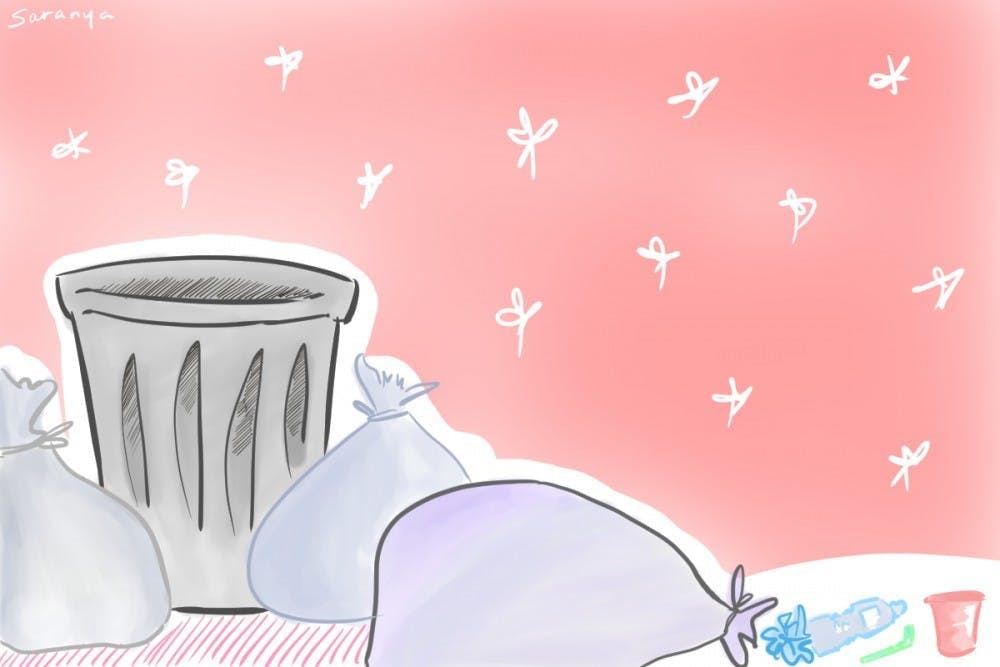In most dining halls, students place their empty dishes and half–eaten meals on a conveyor belt, never to see their leftover food again. It’s easy to assume that food is thrown out and dishes are scrubbed clean for the next meal, with little thought given to things like composting. But a peek behind the scenes at Penn Dining shows their attempts to decrease food waste from the university’s residential dining cafés.
Penn Dining administrators hired sustainability interns and collaborated with the Student Sustainability Association at Penn (SSAP) to implement various initiatives in the dining halls. According to Penn Business Services Director of Communications and External Relations Barbara Lea–Kruger, “We’ll Take it From Here” is a program that reduces confusion surrounding what is and is not compostable.
Through “We’ll Take it From Here,” students drop their waste and dishes in the dish drop in dining halls, rather than sorting compostable food waste on their own. In the kitchen, trained employees separate all compostable food waste, recyclables, and trash.
“Students used to scrape their plates before,” Lea–Kruger says. “It’s kind of complicated what can and cannot go into the waste stream, so we’ve taken it all behind the scenes.”
Penn Dining hired sustainability intern Kelsey Mallon this year to focus exclusively on the university’s commitment to composting and recycling in the dining cafes. According to Mallon, these processes vary with each dining hall.
In 1920 Commons, Kings Court English College House, Falk, and Joe’s Cafe, a New Jersey organic recycling company called Organic Diversion picks up food waste and distributes it to places that use it as fertilizer, such as pig farms. Hill College House, however, has an aerobic digester which minimizes waste weight by removing the liquid and excreting food waste through pipes as waste water. And at Lauder College House, all food waste goes into a BiobiN where it is then broken down and used as nutrients for soil.
Of course, before these processes are implemented, workers separate food waste according to the “We’ll Take it From Here” program. Mallon cites this initiative as playing a central role in decontaminating compostable waste from the dining halls.
“A new freshman on campus may not know,” Mallon says. “All the Penn dining staff are the ones who deal with the waste because they know our waste program here. That makes sure that there’s the same amount of all the food going into the compost.”
Lea–Kruger recognizes that as technology improves, composting practices will continue to change. She says Penn is committed to changing its compost processes so that they will reflect these external advances.
“I think we will constantly be making improvements and changes,” Lea–Kruger says. “I will tell you that the way that compost is managed outside the university changes a lot, so as the external environment changes, our internal environment will change.”
Abbey Waugh (C’20) and Kalyxa Roman (W’20) are co–chairs of the Climate Reality Project at Penn, a group that works with administrators to advocate for renewable electricity on campus by 2030. They said they felt that Penn should do more to educate students about composting and encourage them to practice composting outside of the dining halls.
There is a compost bin behind Harrison College House that students can bring food waste to, but, Abbey and Kalyxa say, many students don’t know it exists or don’t know what is compostable. They say that incorporating a climate sector into the college curriculum or adding compost bins on each floor of the dorms are two ways Penn can encourage sustainable practices like composting.
“I think Penn can do a lot about literally anything related to the environment,” Kalyxa says. “If you don’t take an environmental science class, you just don’t learn about it unless you make the effort to get involved in an environmental club.”
Although she recently started to compost more, Abbey thinks that many Penn students don't because they just don't care enough. She believes that if students were educated about the benefits of composting, the process would become more popular around campus.
“I felt like compost got more popular, but I think that I just knew more about it,” Abbey says. “It’s really like you have to make an effort to do it, and if you have to make an effort to do it then people aren’t going to do it unless they care about it.”

